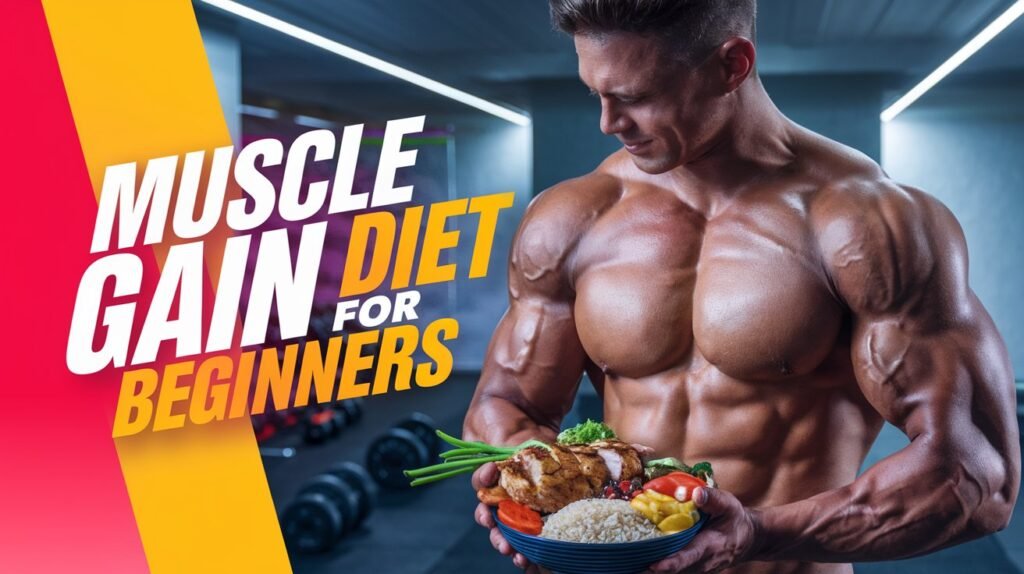Gaining muscle isn’t just about lifting weights it’s also about fueling your body with the right nutrients at the right time. Whether you’re new to fitness or just looking to bulk up in a healthy way, having a solid muscle gain diet plan can make all the difference.
Here’s everything you need to know to get started.
Why Diet Matters for Muscle Growth
When you work out, especially with resistance training, your muscles experience tiny tears. Your body repairs these tears and that’s how muscles grow. But without the right nutrients, your body won’t have the tools it needs to build muscle efficiently.
That’s where diet comes in. Eating the right balance of calories, protein, carbs, and fats supports recovery, boosts performance, and promotes lean muscle gains.
How Many Calories Do You Need to Gain Muscle?
To build muscle, you need to be in a caloric surplus that means eating more calories than your body burns.
-
Beginner tip: Start by adding 250–500 extra calories per day above your maintenance level.
-
This helps you gain muscle without putting on too much fat.
You can estimate your daily calorie needs using an online calculator or by tracking your weight over time. If you’re not gaining weight, increase your intake slightly.
Macronutrient Breakdown for Muscle Gain
Here’s a simple breakdown of the three macronutrients you need:
1. Protein – The Building Block of Muscle
-
Aim for 0.7 to 1 gram of protein per pound of body weight daily.
-
Great sources:
-
Chicken breast
-
Turkey
-
Eggs
-
Greek yogurt
-
Tofu
-
Whey or plant-based protein powder
-
2. Carbohydrates – Fuel for Training
-
Carbs are crucial for energy and recovery.
-
Aim for 2–3 grams of carbs per pound of body weight.
-
Good choices:
-
Brown rice
-
Oats
-
Whole grain bread
-
Quinoa
-
Sweet potatoes
-
Fruits
-
3. Healthy Fats – Hormone Support
-
Don’t fear fat it’s essential for testosterone and overall health.
-
Aim for 0.3–0.5 grams per pound of body weight.
-
Healthy fat sources:
-
Avocados
-
Nuts and seeds
-
Olive oil
-
Fatty fish (like salmon)
-
Sample Muscle Gain Meal Plan for Beginners
Here’s what a typical day might look like:
Breakfast
-
4 scrambled eggs
-
2 slices whole grain toast
-
1 banana
-
1 glass of milk
Snack
-
Greek yogurt with honey and berries
-
Handful of almonds
Lunch
-
Grilled chicken breast
-
Brown rice
-
Steamed broccoli
-
Olive oil drizzle
Post-Workout Shake
-
Whey protein
-
Oat milk or water
-
1 banana
Dinner
-
Baked salmon
-
Quinoa or sweet potato
-
Mixed greens with olive oil
Evening Snack
-
Cottage cheese or casein protein shake
Tips for Success
-
Meal prep: Plan your meals in advance to stay on track.
-
Stay hydrated: Muscles are 75% water drink plenty of it.
-
Don’t skip meals: Eat every 3–4 hours to support muscle repair and growth.
-
Track your progress: Monitor your weight and adjust your intake as needed.
When to Consider Supplements
Whole foods should be your main focus, but some supplements may help:
-
Whey protein: Convenient way to meet protein goals.
-
Creatine monohydrate: Backed by research for strength and size gains.
-
Multivitamins: Helpful if your diet lacks certain nutrients.
Always consult a healthcare provider before starting any supplement.
The Bottom Line
Building muscle as a beginner isn’t about eating everything in sight it’s about eating smart. Combine a structured workout routine with a clean, consistent diet full of nutrient-dense foods, and you’ll be on the right path to strong, sustainable muscle growth.
